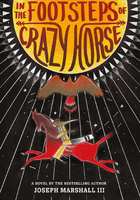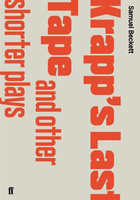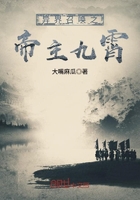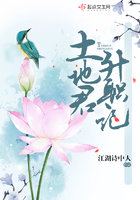Across the hall from Sai's room, the judge swallowed a Calmpose, for he found he was upset by his granddaughter's arrival. He lay awake in bed, Mutt at his side. "Little pet," he clucked over her. "What long curly ears, hm? Look at all these curls." Each night Mutt slept with her head on his pillow, and on cold nights she was wrapped in a shawl of angora rabbit wool. She was asleep, but even so, one of her ears cocked as she listened to the judge while she continued snoring.
The judge picked up a book and tried to read, but he couldn't. He realized, to his surprise, that he was thinking of his own journeys, of his own arrivals and departures, from places far in his past. He had first left home at the age of twenty, with a black tin trunk just like the one Sai had arrived with, on which white letters read "Mr. J. P. Patel, SS Strathnaver." The year was 1939. The town he had left was his ancestral home of Piphit. From here he had journeyed to the Bombay dock and then sailed to Liverpool, and from Liverpool he had gone to Cambridge.
Many years had passed, and yet the day returned to him vividly, cruelly.
The future judge, then called only Jemubhai—or Jemu—had been serenaded at his departure by two retired members of a military band hired by his father-in-law. They had stood on the platform between benches labeled "Indians Only" and "Europeans Only," dressed in stained red coats with dull metallic ricrac unraveling about the sleeves and collars. As the train left the station, they played "Take Me Back to Dear Old Blighty," a tune they remembered was appropriate to the occasion of leaving.
The judge was accompanied by his father. At home, his mother was weeping because she had not estimated the imbalance between the finality of good-bye and the briefness of the last moment.
"Don't let him go. Don't let him go."
Her little son with his frail and comical mustache, with his love for her special choorva that he would never get in England and his hatred of cold that he would get too much of; with his sweater that she had knit in a pattern fanciful enough to express the extravagance of her affection; with his new Oxford English Dictionary and his decorated coconut to be tossed as an offering into the waves, so his journey might be blessed by the gods.
Father and son had rattled forth all through the morning and afternoon, the immensity of the landscape within which Jemu had unknowingly lived impressing itself upon him. The very fact that they were sitting in the train, the speed of it, rendered his world trivial, indicated through each window evidence of emptiness that stood eager to claim an unguarded heart. He felt a piercing fear, not for his future, but for his past, for the foolish faith with which he had lived in Piphit.
The malodor of Bombay Duck drying on a scaffolding of sticks alongside the track snuffed his thoughts for a moment; passing into neutral air, his fears came up again.
He thought of his wife. He was a one-month-married man. He would return … many years from now … and then what… ? It was all very strange. She was fourteen years old and he had yet to properly see her face.
They crossed the saltwater creek into Bombay, arrived at the Victoria Terminus, where they turned down hotel touts to stay with an acquaintance of his father-in-law's, and woke early to make their way to the Ballard Pier.
When Jemubhai had first learned that the ocean traveled around a globe, he had felt strengthened by this fact, but now when he stood on the confetti-strewn deck of the ship, looking out at the sea flexing its endless muscles, he felt this knowledge weaken him. Small waves subsided against the side of the ship in a parsimonious soda water fizz, over which the noise of the engine now exerted itself. As three siren blasts rent the air, Jemu's father, searching the deck, located his son.
"Don't worry," he shouted. "You'll do first class first." But his tone of terror undid the reassurance of the words.
"Throw the coconut!" he shrieked.
Jemubhai looked at his father, a barely educated man venturing where he should not be, and the love in Jemubhai's heart mingled with pity, the pity with shame. His father felt his own hand rise and cover his mouth: he had failed his son.
The ship moved, the water split and spilled, flying fish exploded silver above the unravelment, Tom Collinses were passed around, and the party atmosphere reached a crescendo. The crowd on the shore became flotsam churning at the tide's hem: scallops and starbursts, petticoat ruffles, rubbishy wrappings and saliva flecks, fish tails and tears… . Soon it vanished in the haze.
Jemu watched his father disappear. He didn't throw the coconut and he didn't cry. Never again would he know love for a human being that wasn't adulterated by another, contradictory emotion.
They sailed past the Colaba Lighthouse and out into the Indian Ocean until there was only the span of the sea whichever way he turned.
He was silly to be upset by Sai's arrival, to allow it to trigger this revisitation of his past. No doubt the trunks had jogged his memory.
Miss S. Mistry, St. Augustine's Convent.
Mr. J. P. Patel, SS Strathnaver.
But he continued to remember: when he located his cabin, he found he had a cabinmate who had grown up in Calcutta composing Latin sonnets in Catullan hendecasyllables, which he had inscribed into a gilded volume and brought along with him. The cabinmate's nose twitched at Jemu's lump of pickle wrapped in a bundle of puris; onions, green chilies, and salt in a twist of newspaper; a banana that in the course of the journey had been slain by heat. No fruit dies so vile and offensive a death as the banana, but it had been packed just in case. In case of What? Jemu shouted silently to his mother.
In case he was hungry along the way or it was a while before meals could be properly prepared or he lacked the courage to go to the dining salon on the ship, given that he couldn't eat with knife and fork—
He was furious that his mother had considered the possibility of his humiliation and thereby, he thought, precipitated it. In her attempt to cancel out one humiliation she had only succeeded in adding another.
Jemu picked up the package, fled to the deck, and threw it overboard. Didn't his mother think of the inappropriateness of her gesture? Undignified love, Indian love, stinking, unaesthetic love—the monsters of the ocean could have what she had so bravely packed getting up in that predawn mush.
The smell of dying bananas retreated, oh, but now that just left the stink of fear and loneliness perfectly exposed.
In his cabin bunk at night, the sea made indecent licking sounds about the ship's edge. He thought of how he had half undressed and hurriedly re-dressed his wife, of how he had only glimpsed her expression, just bits and pieces of it in the slipping of the pallu over her head. However in memory of the closeness of female flesh, his penis reached up in the dark and waved about, a simple blind sea creature but refusing to be refused. He found his own organ odd: insistent but cowardly; pleading but pompous.
They berthed at Liverpool and the band played "Land of Hope and Glory." His cabinmate, in Donegal tweeds, hailed a porter to help with his luggage—a white person to pick up a brown person's bags! Jemubhai carried his own bags, stumbled onto a train, and on his way to Cambridge, found himself shocked as they progressed through fields by the enormous difference between the (boxy) English and the (loopy) Indian cow.
He continued to be amazed by the sights that greeted him. The England in which he searched for a room to rent was formed of tiny gray houses in gray streets, stuck together and down as if on a glue trap. It took him by surprise because he'd expected only grandness, hadn't realized that here, too, people could be poor and live unaesthetic lives. While he was unimpressed, though, so too were the people who answered his knock, when they opened their doors to his face: "Just let," "All full," or even a curtain lifted and quickly dropped, a stillness as if all the inhabitants had, in that instant, died. He visited twenty-two homes before he arrived at the doorstep of Mrs. Rice on Thornton Road. She didn't want him either, but she needed the money and her house was so situated—on the other side of the train station from the university—she was concerned she wouldn't be able to find a lodger at all.
Twice a day she put out a tray at the foot of the stairs—boiled egg, bread, butter, jam, milk. After a spate of nights lying awake listening to the borborygmus of his half-empty stomach, thinking tearfully of his family in Piphit who thought him as worthy of a hot dinner as the queen of England, Jemubhai worked up the courage to ask for a proper evening meal. "We don't eat much of a supper ourselves, James," she said, "too heavy on the stomach for Father." She always called her husband Father and she had taken to calling Jemubhai James. But that evening, he found on his plate steaming baked beans on toast.
"Thank you. Absolutely delicious," he said as Mr. Rice sat looking steadily out of the window.
Later, he marveled at this act of courage, since he was soon to lose it all.
He had registered at Fitzwilliam with the help of an essay he penned for the entrance examination, "Similarities and Differences between the French and Russian Revolutions." Fitzwilliam was a bit of a joke in those days, more a tutoring place than a college, but he began immediately to study, because it was the only skill he could carry from one country to another. He worked twelve hours at a stretch, late into the night, and in thus withdrawing, he failed to make a courageous gesture outward at a crucial moment and found, instead, that his pusillanimity and his loneliness had found fertile soil. He retreated into a solitude that grew in weight day by day. The solitude became a habit, the habit became the man, and it crushed him into a shadow.
But shadows, after all, create their own unease, and despite his attempts to hide, he merely emphasized something that unsettled others. For entire days nobody spoke to him at all, his throat jammed with words unuttered, his heart and mind turned into blunt aching things, and elderly ladies, even the hapless—blue-haired, spotted, faces like collapsing pumpkins—moved over when he sat next to them in the bus, so he knew that whatever they had, they were secure in their conviction that it wasn't even remotely as bad as what he had. The young and beautiful were no kinder; girls held their noses and giggled, "Phew, he stinks of curry!"
Thus Jemubhai's mind had begun to warp; he grew stranger to himself than he was to those around him, found his own skin odd-colored, his own accent peculiar. He forgot how to laugh, could barely manage to lift his lips in a smile, and if he ever did, he held his hand over his mouth, because he couldn't bear anyone to see his gums, his teeth. They seemed too private. In fact, he could barely let any of himself peep out of his clothes for fear of giving offence. He began to wash obsessively, concerned he would be accused of smelling, and each morning he scrubbed off the thick milky scent of sleep, the barnyard smell that wreathed him when he woke and impregnated the fabric of his pajamas. To the end of his life, he would never be seen without socks and shoes and would prefer shadow to light, faded days to sunny, for he was suspicious that sunlight might reveal him, in his hideousness, all too clearly.
He saw nothing of the English countryside, missed the beauty of carved colleges and churches painted with gold leaf and angels, didn't hear the choir boys with the voices of girls, and didn't see the green river trembling with replications of the gardens that segued one into the other or the swans that sailed butterflied to their reflections.
Eventually he felt barely human at all, leaped when touched on the arm as if from an unbearable intimacy, dreaded and agonized over even a "How-do-you-do-lovely-day" with the fat woman dressed in friendly pinks who ran the corner store. "What can I get you? Say that again, duck… ." she said to his mumble, leaned forward to scoop up his words, but his voice ran back and out as he dissolved into tears of self-pity at the casual affection. He began to walk farther across town to more anonymous shops, and when he bought a shaving brush and the shop girl said her husband owned the same item exactly, at the acknowledgment of their identical human needs, the intimacy of their connection, shaving, husband, he was overcome at the boldness of the suggestion.
The judge turned on the light and looked at the expiration date on the Calmpose package. No, the medicine was still valid: it should have worked. Yet, instead of putting him to sleep, it had caused him to dream a nightmare wide awake.
He lay there until the cows began to boom like foghorns through the mist and Uncle Potty's rooster, Kookar Raja, sent his kukrookoo up like a flag, sounding both silly and loud as if calling everyone to the circus. He had been healthy again ever since Uncle Potty had turned him upside down, stuck him headfirst into a tin can and eradicated the bluebottles in his bottom with a heavy spray of Flit.
Confronted yet again with his granddaughter, sitting at the breakfast table, the judge instructed the cook to take her to meet the tutor he had hired, a lady by the name of Noni who lived an hour's walk away.
Sai and cook trudged the long path that traveled thin and black as a rat snake up and down the hills, and the cook showed her the landmarks of her new home, pointed out the houses and told her who lived where. There was Uncle Potty, of course, their nearest neighbor, who had bought his land from the judge years ago, a gentleman farmer and a drunk; and his friend Father Booty of the Swiss dairy, who spent each evening drinking with Uncle Potty. The men had rabbit-red eyes, their teeth were browned by tobacco, their systems needed to be dredged, but their spirits were still nimble. "Hello Dolly," Uncle Potty said, waving to Sai from his veranda, which projected like a ship's deck over the steep incline. It was on this veranda that Sai would first hear the Beatles. And also: "All that MEAT and NO PERTATAS? Just ain't right, like GREEN TERMATAS!"
The cook pointed out the defunct pisciculture tanks, the army encampment, the monastery on top of Durpin hill, and down below, an orphanage and henhouse. Opposite the henhouse, so they could get their eggs easily, lived a pair of Afghan princesses whose father had gone to Brighton on holiday and returned to find the British had seated someone else on his throne. Eventually the princesses were given refuge by Nehru (such a gentleman!). In a small drab house lived Mrs. Sen, whose daughter, Mun Mun, had gone to America.
And finally there was Noni (Nonita), who lived with her sister Lola (Lalita) in a rose-covered cottage named Mon Ami. When Lola's husband had died of a heart attack, Noni, the spinster, had moved in with her sister, the widow. They lived on his pension, but still they needed more money, what with endless repairs being done to the house, the price of everything rising in the bazaar, and the wages of their maid, sweeper, watchman, and gardener.
So, in order to make her contribution to household finances, Noni had accepted the judge's request that she tutor Sai. Science to Shakespeare. It was only when Noni's abilities in mathematics and science began to falter when Sai was sixteen, that the judge was forced to hire Gyan to take over these subjects.
"Here is Saibaby," said the cook, presenting her to the sisters.
They had regarded her sadly, orphan child of India's failing romance with the Soviets.
"Stupidest thing India ever did, snuggling up to the wrong side. Do you remember when Chotu and Motu went to Russia? They said they had not seen the like," remarked Lola to Noni, "even in India. Inefficient beyond belief."
"And do you recall," said Noni back to Lola, "those Russians who lived next door to us in Calcutta? They'd go running out every morning and come back with mountains of food, remember? There they'd be, slicing, boiling, frying mountains of potatoes and onions. And then, by evening, they'd go running to the bazaar again, hair flying, coming back crazy with excitement and even more onions and potatoes for dinner. To them India was a land of plenty. They'd never seen anything like our markets."
But despite their opinion of Russia and Sai's parents, over the years they grew very fond of Sai.















